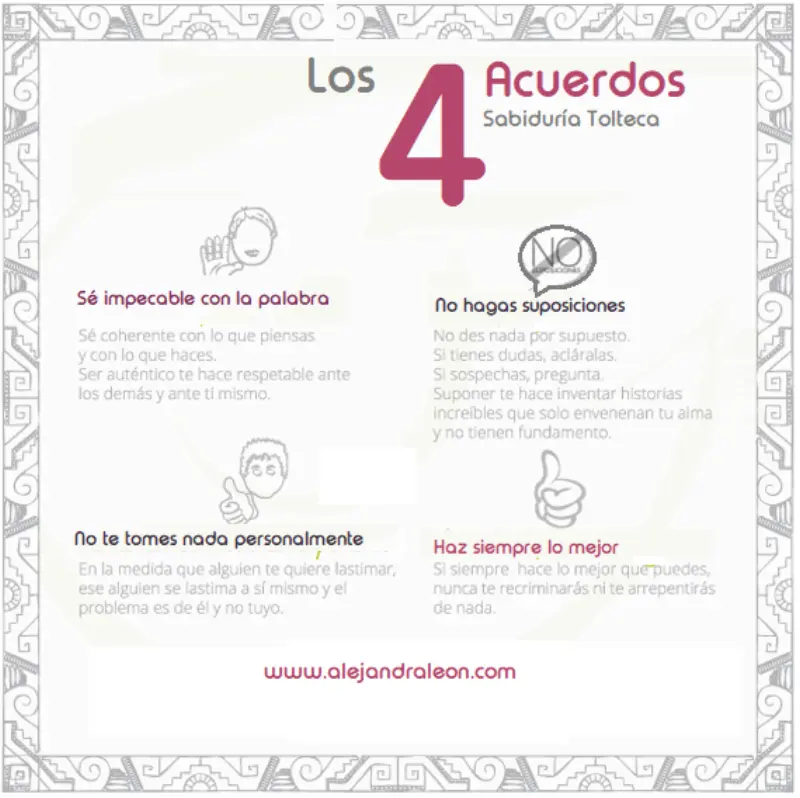A few days ago, we started a book club among friends, and the first book we have chosen is: "The Four Agreements" by Miguel Ruiz.
Although it's a book I read a long time ago, it's one of those books that keeps changing and transforming with time and personal growth.
Have you read it? If you haven't, I invite you to do so, to put its teachings into practice, and to share your experience.

"There is no reason to suffer. The only reason you suffer is because you demand it of yourself. If you look at your life, you will find many excuses to suffer, but no valid reason. The same is true for happiness. The only reason you are happy is because you decide to be happy. Happiness is a choice, as is suffering." (Miguel Ruiz).
Domestication and the Dream of the Planet
Are things as we see them, as we feel them, or do we basically interpret what we have been taught to interpret?
For the ancient Toltec culture (Mexico), the "reality" we assume socially is nothing more than a collective dream, the dream of the planet. From the moment we are born, we interpret reality through agreements, and in doing so, we agree with the adult world on what a table is, what a dress is, but also on what is "right" and what is "wrong," and even who we are or what our place is in the world (in the family, in class, at work). Miguel Ruiz calls this process domestication.
"Domestication is so powerful that at a certain point in our lives, we no longer need anyone to domesticate us. We don't need our mother or father, the school, or the church to domesticate us. We are so well trained that we are our own trainer. We are a self-domesticated animal."
The Judge and the Victim
During this learning process, we incorporate the judge and the victim into our own personalities.
The judge represents that tendency in our mind that constantly reminds us of the book of law that governs our lives - what is right and what is wrong - and rewards us and, more often, punishes us.
The victim is that part within each person that suffers the demands of their own inner judge. We suffer, regret, blame ourselves, and punish ourselves over and over again, every time the memory takes its toll.
And as a consequence of the system itself, fear is instilled in our lives.
Fear and self-demands are the worst enemies of our thinking and, therefore, of our lives. During the process of domestication, we form a mental image of perfection, which is not a bad path to follow. "The problem is that because we are not perfect, we reject ourselves. And the degree of rejection depends on how effective adults have been in breaking our integrity."
If the book of law that governs our lives (our morality, our logic, our "common sense") does not fulfill its objectives, which fundamentally consist of making us happy and in harmony, it is evident that it does not work. And if it doesn't work, it needs to be changed. And we do that by reviewing our agreements (our unquestionable interpretation, our value system), unmasking those that are not valid and replacing them with others.
The Toltec philosophy proposes four basic agreements:
- Be impeccable with your word
Words have great creative power; they create worlds, realities, and above all, emotions. Words can build or destroy, heal or harm. Being impeccable with your word means using language in the direction of truth and love. It means speaking with integrity, avoiding gossip, and refraining from using words to spread negativity or create unnecessary suffering. By being impeccable with your word, you align your language with the power of creation and contribute to a more harmonious and uplifting reality.
- Don't take anything personally
When others express their opinions, judgments, or criticisms, it is essential not to take it personally. What others say or do is a reflection of their own perception and belief system, shaped by their domestication and life experiences. By not taking things personally, you free yourself from needless suffering and emotional attachments. You understand that what others say is a projection of their own reality and has nothing to do with your worth or identity.
- Don't make assumptions
Assumptions are often based on incomplete information, misinterpretations, or unfounded beliefs. Making assumptions can lead to misunderstandings, conflicts, and unnecessary suffering. To avoid this, it is important to ask questions, seek clarity, and communicate openly. By not making assumptions, you cultivate a mindset of curiosity, openness, and understanding. You embrace the power of clear communication and genuine connection with others.
- Always do your best
Doing your best means giving your maximum effort in every moment, regardless of the circumstances. It is not about perfection or comparing yourself to others but about recognizing and honoring your own potential. Your best will vary from moment to moment, depending on your energy, health, and available resources. By always doing your best, you avoid self-judgment and regret. You can take pride in knowing that you have given your all and can accept the outcomes with gratitude and self-compassion.
By adopting and practicing these four agreements, you can transform your life and break free from the limitations and suffering imposed by domestication. You become the conscious creator of your own reality and experience greater freedom, authenticity, and happiness.